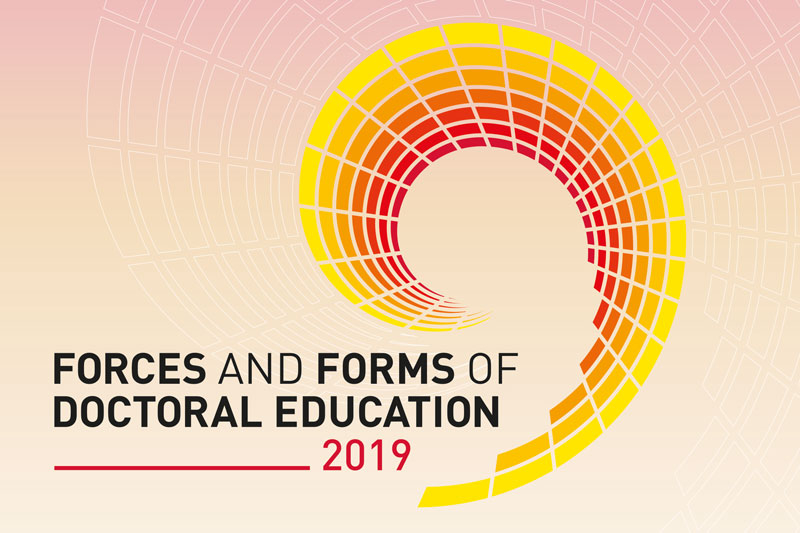"Our Future Depends on the Next Generation of Scientists."
Interview with Dr. Christian Peters, co-organizer of the conference "Forces and Forms of Doctoral Education Worldwide" in Hanover, Germany on September 5 to 6, 2019
170 guests from Germany and abroad will be discussing the prospects for doctoral training in Hanover on September 5 to 6, 2019. The fully booked conference will be jointly organized by the Center for Innovation and Research in Graduate Education (CIRGE), Washington, the University of Bremen, the International Graduate School of Social Sciences (BIGSSS), Bremen and the Volkswagen Foundation.
Six questions about the conference to Christian Peters, BIGSSS managing director and co-organizer:
What are the most important challenges that will shape doctoral training in the future?
It’s difficult to speak in a general manner about so many different types of doctoral training. One great advantage of the international orientation of this conference is that it clearly illustrates the diversity of conditions under which doctorates are awarded worldwide. Science cultures, demographic data and even the role models of early career researchers are globally as diverse as national funding systems and regional academic and non-academic labor markets. Here I see many opportunities to learn from each other.
Having said that, though, we are currently observing a certain convergence in doctoral education – and a number of related global challenges: I think the massive datafication and especially the machine-learning evaluation of data will drive a comprehensive structural change in research over the next two decades. What roles do scientists have in such an environment shaped by artificial intelligence? How will the projects of doctoral students change as a result? What role will creativity – and perhaps even intuition – have to play? What knowledge must young people already bring with them, and what must they be taught?
In a growing number of countries, politicians are encroaching on the freedom of science. Will this also be a topic of discussion at the conference?
It certainly will! It's true: In many countries the production of knowledge is under pressure as populist and authoritarian regimes undermine the independence of research. Discourses suffer from the confusing offer of half-truths and misinformation that are presented in the social media as objective and factual. Science must actively maintain the sovereignty of interpretation in these arenas, must become more resistant, and must convey complexity without blurring the truth. Nothing can replace scientific evidence as the basis on which politics and society can seek orientation. As a consequence, doctoral students should be confronted early on with their demanding dual role as elites of knowledge and knowledge transfer. Above all, the latter, that is the trustworthy and responsible communication of science to the public at large, will in my eyes play an increasingly important role.
Who does the conference address?
A broad international audience that is occupied with the topic of doctoral training from various angles. We expect representatives from university and educational research, members of science administration, university management, and especially early career researchers who are directly affected.
Which contributions in the conference program would you like to highlight?
I’m particularly looking forward to the keynote by Jonathan Jansen, President of the South African Academy of Sciences. He’ll be talking about the value of doctoral studies in an environment of global educational expansion. And I’m interested to see how the interactive format of the conference will work out: On both days we will involve the audience in the evaluation of our analyses via an app and small, spontaneously formed working groups. We also encourage participants to reflect on the practical implementation of policy recommendations. The conference should be both scientifically sound and socially relevant. Ideally, it should succeed in fulfilling the transfer claim I’ve been talking about. I‘m quite optimistic about this.
What messages should the conference convey?
I hope for a lively and respectful discussion and a lot of comparative knowledge. How much global commonality in procedures and institutions can be considered a good thing? How much diversity with regard to forms of knowledge and methodologies do our doctoral students need in order to remain independent, innovative and willing to take risks? These are big questions, but I think the forum will be ideal. In the end, I expect some balanced but critical recommendations for the interested public and for those who decide on the political and financial parameters surrounding doctoral studies. When we talk about young scientists, we are also talking about the future viability of societies – and we have to be quite clear about that.
Will there be a documentation?
A book is not planned; but certainly one or the other scientific publication will emerge from the conference. We would also like to present a website in Hanover where you can get background information and learn more about the conference series which Maresi Nerad and her colleagues have been organizing at regular intervals since 2005.

